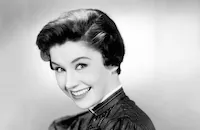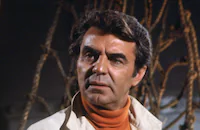The Scarface Mob
Brief Synopsis
Cast & Crew
Phil Karlson
Robert Stack
Keenan Wynn
Barbara Nichols
Patricia Crowley
Neville Brand
Film Details
Technical Specs

Synopsis
Eliot Ness is convinced that syndicate graft is buying local police protection when a raid on the headquarters of Al Capone's gang proves unsuccessful. After receiving the support of the district attorney, Ness picks several reliable men from the Treasury Department and sets up a special office in Chicago. The Treasury agents establish the whereabouts of one of Capone's stills, and Capone henchman Frank Nitti offers Ness a bribe to leave it alone; but Ness steps up the raids, and as a result the mob votes to have Ness killed. Ness places an informer in the gang's headquarters and closes six more breweries. Capone, released from jail, returns to declare an all-out war on Ness and his men. He breaks the wire tap, kills the informer, and hires Jimmy Napoli to murder Ness. Soon afterward, the government puts together a tax-evasion case against Capone, and he is sentenced to 11 years in prison.

Director

Phil Karlson
Cast

Robert Stack

Keenan Wynn

Barbara Nichols

Patricia Crowley

Neville Brand

Bill Williams

Joe Mantell
Bruce Gordon

Peter Leeds
Eddie Firestone
Robert Osterloh

Paul Dubov
Abel Fernández

Paul Picerni
John Beradino
Wolfe Barzell
Frank Wilcox

Peter Mamakos

Wally Cassell
Herman Rudin

Richard Benedict
Bern Hoffman

Frank De Kova

James Westerfield
Walter Winchell
Crew
Jack Aldworth
Desi Arnaz
Jack Baker
Ralph Berger
Jerry Bos
Ed Butterworth
Maria Donovan
Sandy Grace
Bert Granet
Wilbur Hatch
Quinn Martin
Cam Mcculloch
Vincent Mceveety
Paul Monash
Lorraine Roberson
Frank T. Smith
Charles Straumer
Robert L. Swanson

Film Details
Technical Specs

Articles
Robert Stack, 1919-2003
Stack was born in Los Angeles on January 13, 1919 to a well-to-do family but his parents divorced when he was a year old. At age three, he moved with his mother to Paris, where she studied singing. They returned to Los Angeles when he was seven, by then French was his native language and was not taught English until he started schooling.
Naturally athletic, Stack was still in high school when he became a national skeet-shooting champion and top-flight polo player. He soon was giving lessons on shooting to such top Hollywood luminaries as Clark Gable and Carol Lombard, and found himself on the polo field with some notable movie moguls like Darryl Zanuck and Walter Wanger.
Stack enrolled in the University of Southern California, where he took some drama courses, and was on the Polo team, but it wasn't long before some influential people in the film industry took notice of his classic good looks, and lithe physique. Soon, his Hollywood connections got him on a film set at Paramount, a screen test, and eventually, his first lead in a picture, opposite Deanna Durbin in First Love (1939). Although he was only 20, Stack's natural delivery and boyish charm made him a natural for the screen.
His range grew with some meatier parts in the next few years, especially noteworthy were his roles as the young Nazi sympathizer in Frank Borzage's chilling The Mortal Storm (1940), with James Stewart, and as the Polish flier who woos a married Carole Lombard in Ernst Lubitsch's To Be or Not to Be (1942).
After serving as a gunnery officer in the Navy during World War II, Stack returned to the screen, and found a few interesting roles over the next ten years: giving Elizabeth Taylor her first screen kiss in Robert Thorp's A Date With Judy (1948); the leading role as an American bullfighter in Budd Boetticher's The Bullfighter and the Lady (1951); and as a pilot in William Wellman's The High and the Mighty (1954), starring John Wayne. However, Stack saved his best dramatic performances for Douglas Sirk in two knockout films: as a self-destructive alcoholic in Douglas Sirk's Written on the Wind (1956), for which he received an Academy Award nomination for supporting actor; and sympathetically portraying a fallen World War I pilot ace who is forced to do barnstorming stunts for mere survival in Tarnished Angels (1958).
Despite proving his capabilities as a solid actor in these roles, front rank stardom oddly eluded Stack at this point. That all changed when Stack gave television a try. The result was the enormously popular series, The Untouchables (1959-63). This exciting crime show about the real-life Prohibition-era crime-fighter Eliot Ness and his G-men taking on the Chicago underworld was successful in its day for several reasons: its catchy theme music, florid violence (which caused quite a sensation in its day), taut narration by Walter Winchell, and of course, Stack's trademark staccato delivery and strong presence. It all proved so popular that the series ran for four years, earned an Emmy for Stack in 1960, and made him a household name.
Stack would return to television in the late '60s, with the The Name of the Game (1968-71), and a string of made-for-television movies throughout the '70s. His career perked up again when Steven Spielberg cast him in his big budget comedy 1941 (1979) as General Joe Stillwell. The film surprised many viewers as few realized Stack was willing to spoof his granite-faced stoicism, but it won him over many new fans, and his dead-pan intensity would be used to perfect comic effect the following year as Captain Rex Kramer (who can forget the sight of him beating up Hare Krishnas at the airport?) in David and Jerry Zucker's wonderful spoof of disaster flicks, Airplane! (1980).
Stack's activity would be sporadic throughout the remainder of his career, but he returned to television, as the host of enormously popular Unsolved Mysteries (1987-2002), and played himself in Lawrence Kasden's comedy-drama Mumford (1999). He is survived by his wife of 47 years, Rosemarie Bowe Stack, a former actress, and two children, Elizabeth and Charles, both of Los Angeles.
by Michael T. Toole

Robert Stack, 1919-2003
Quotes
Trivia
Notes
A theatrical release of Westinghouse-Desilu Playhouse's "The Untouchables," a 2-part television drama registered for copyright 27 Mar, April 10, 1959; LP14941, LP14942 and shown 20 April and April 27, 1959.














